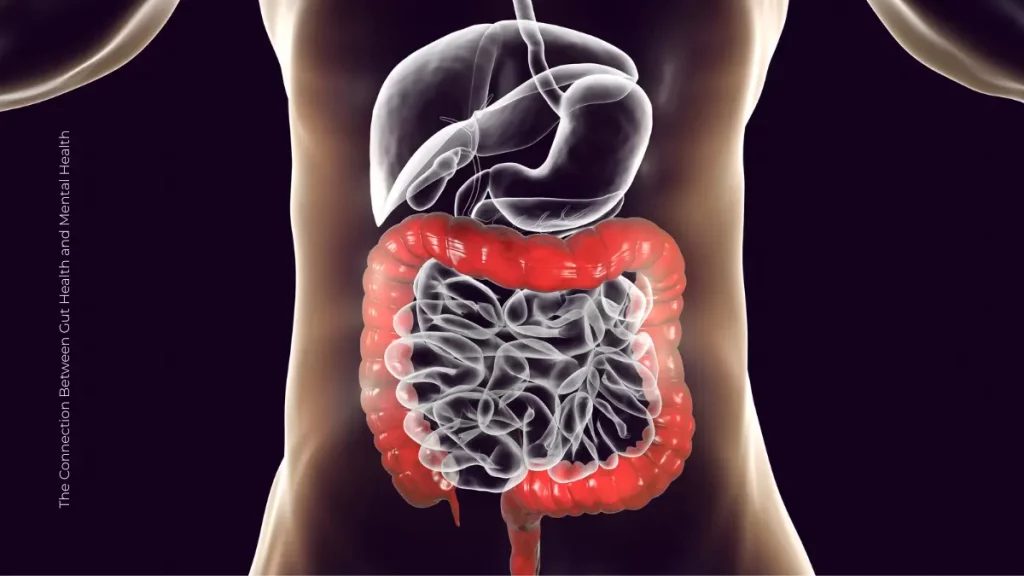The Connection Between Gut Health and Mental Health

When we think about mental health, we often focus on the brain. But there’s another part of the body that plays a surprisingly big role in how we feel emotionally: the gut.
Over the past few years, scientists and mental health professionals have discovered a strong connection between gut health and brain function. This relationship, often called the gut-brain axis, shows that our digestive system doesn’t just process food—it also sends signals that influence mood, anxiety, and even depression.
In this article, we’ll explore how the gut and brain communicate, the role of gut bacteria in mental well-being, and how simple changes in diet can support both your digestive and emotional health.
What Is the Gut-Brain Axis?
The gut-brain axis is a two-way communication system between your brain and your digestive system. This connection involves:
– The vagus nerve, which links the brainstem to the gut
– Hormones, like serotonin and cortisol
– Immune system signals
– Gut microbiota, or the trillions of bacteria living in your digestive tract
This system allows your gut to send messages to your brain and vice versa. When your gut is out of balance, it can impact how your brain functions—and how you feel emotionally.
Gut Bacteria and Mood
Your gut is home to over 100 trillion microorganisms, including bacteria that help digest food, regulate inflammation, and protect against illness. These microbes also produce neurotransmitters, like:
– Serotonin – affects mood, sleep, and appetite
– Dopamine – linked to motivation and pleasure
– GABA – helps reduce anxiety
In fact, nearly 90% of serotonin is made in the gut (Gershon, 1998). So when your gut bacteria are healthy and diverse, they help produce the chemicals your brain needs to stay balanced. But when there’s an imbalance—called dysbiosis—it can lead to inflammation, poor digestion, and symptoms of anxiety or depression.
Scientific Evidence Supporting the Link
Recent studies continue to show just how important gut health is for mental wellness:
– A 2021 review in Nature Reviews Gastroenterology & Hepatology found that people with depression often have less diversity in their gut microbiome than those without depression.
– A 2019 study in General Psychiatry reported that probiotic and prebiotic supplements helped reduce symptoms of anxiety in both healthy individuals and those with clinical diagnoses.
– A large 2020 study published in Cell suggested that specific strains of gut bacteria may influence the production of mood-regulating neurotransmitters.
While researchers are still studying the details, the message is clear: taking care of your gut is good for your mind.
Symptoms of Poor Gut Health That Affect Mental Health
When your gut isn’t functioning well, it can affect more than just digestion. Signs that your gut may be impacting your mental health include:
– Frequent bloating, gas, or discomfort
– Food sensitivities or irregular bowel movements
– Fatigue or brain fog
– Mood swings or irritability
– Anxiety or depressive symptoms without a clear cause
If you notice a pattern between digestive problems and emotional struggles, your gut could be playing a role.
Foods That Support Gut and Mental Health
You don’t need a complicated diet to start supporting your gut. The key is to focus on whole, fiber-rich foods and reduce things that cause inflammation.
1. Probiotic-Rich Foods
These foods contain live bacteria that help improve your gut microbiome.
– Yogurt with live cultures
– Kefir
– Sauerkraut
– Kimchi
– Miso
2. Prebiotic Foods
These are plant fibers that feed the good bacteria already living in your gut.
– Garlic
– Onions
– Bananas
– Oats
– Asparagus
3. Omega-3 Fatty Acids
Found in fatty fish, walnuts, and flaxseeds, omega-3s help reduce inflammation and improve brain function.
4. Fermented Foods
Fermented items like kombucha and tempeh contain beneficial bacteria and enzymes that support digestion.
5. Hydration
Drinking enough water helps the digestive system process food and remove waste effectively.
Foods to Limit
Some foods may harm gut health, especially when consumed in excess:
– Highly processed foods
– Artificial sweeteners
– Refined sugars
– Excessive alcohol
– Fried or fatty foods
These can increase gut inflammation and reduce the diversity of helpful bacteria.
Other Gut-Friendly Habits
1. Stress Management
Chronic stress can negatively affect your gut bacteria and lead to digestive issues. Practices like deep breathing, yoga, or meditation can support both gut and brain health.
2. Regular Sleep
Lack of sleep disrupts your body’s natural rhythms, including digestion and mood regulation. Aim for 7–9 hours of restful sleep each night.
3. Exercise
Physical activity helps regulate bowel movements and supports a healthy microbiome. Even walking 20–30 minutes a day can make a difference.
When to See a Professional
If you’re struggling with digestive issues, unexplained mood changes, or both, talk to a healthcare provider. A registered dietitian or integrative mental health professional can help you understand the gut-brain connection more deeply and recommend the right approach for you.
Final Thoughts
The connection between gut health and mental health is a reminder that our bodies and minds are deeply linked. When we nurture our gut with good food, rest, and balance, we’re also supporting our emotional well-being.
Taking care of your mental health isn’t just about what’s going on in your head—it’s about caring for your whole self. And sometimes, healing begins in the gut.
References:
– Gershon, M. D. (1998). The Second Brain: A Groundbreaking New Understanding of Nervous Disorders of the Stomach and Intestine. Harper Perennial.
– Foster, J. A., & Neufeld, K. A. M. (2013). Gut–brain axis: How the microbiome influences anxiety and depression. Trends in Neurosciences, 36(5), 305–312. – Liu, R. T. et al. (2021). The microbiome in depression: A review and comparison of two different theories. Nature Reviews Gastroenterology & Hepatology.
